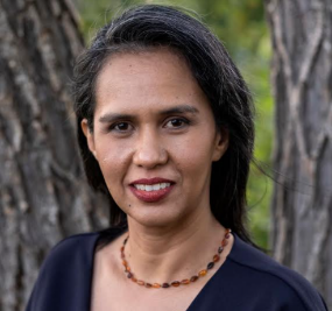
Hello everyone! We are Martha Hernandez-Martinez, MPA & Lumarie Orozco, MA, community psychologists currently working at Casa de Esperanza, a national advocacy organization on domestic violence focusing on Latino communities. Through the National Latin@ Network for Healthy Families and Communities (NLN), Casa de Esperanza’s national clearinghouse for policy, training, and research, we provide training and technical assistance to build the capacity of those interested in better serving Latino communities and to support the work of Latino culturally specific (CS) organizations and community-based organizations (CBOs).

Evaluations can provide the guidance and information necessary for individuals, communities, and organizations to assess needs, identify gaps and inform the development of any enhancements or changes that need to occur within any given project, program, initiative or within any given organization, agency, or structure intentionally and thoughtfully.
For underserved communities that continuously experience deficits, lack of services or limited access and opportunities, evaluation can aid transformation and opportunity. A critical strategy is the development of indicators that reflect the lived realities and conditions faced by those most affected by the issue at hand. Indicators that promote equity must be uncomplicated, relatable, and easy to comprehend, explain, and be used by community members. They must be able to track and adapt information and identify any authentic and effective progress that has been achieved, specially by those who are the most impacted.
An example would be evaluating language access provisions that increase access to services for limited English proficient immigrant women who experience intimate partner violence. Shifting our lens from quantifying how many received language interpretation services, to a more equitable evaluation approach that focuses on the impact that meaningful language access provision has on parity in accessing services critical to safety, well- being and health and the impact that it has had on these women and their communities. The evaluation should tell the story of how well organizations and communities are serving and enacting their values, and the impact that this level of intentionality has on individuals and communities, instead of relying solely on fulfilling funder requirements by quantifying or reaching a set number/percentage. It is only then, that we can really experience what it means to put an equitable evaluation into practice.
Leaders, members, and community-based organizations can help to develop and design evaluations that are centered and informed by community. Some specific guidelines and principles produced by indigenous communities and other culturally and linguistically specific communities are:
- Public Statement on Cultural Competence in Evaluation
- A Roadmap for Collaborative and Effective Evaluation in Tribal Communities
- Guiding principles for engaging in research with Native America communities
- Cultural competence in evaluation
- The American Evaluation Association is celebrating CP TIG Week with our colleagues in the Community Psychology Topical Interest Group. The contributions all week come from CP TIG members. Do you have questions, concerns, kudos, or content to extend this aea365 contribution? Please add them in the comments section for this post on the aea365 webpage so that we may enrich our community of practice. Would you like to submit an aea365 Tip? Please send a note of interest to aea365@eval.org. aea365 is sponsored by the American Evaluation Association and provides a Tip-a-Day by and for evaluators.

Hello! I am a student at Queens University (Ontario, Canada) taking a course in program evaluation as part of my Professional Masters of Education (PME) program. A key component of our coursework has been to connect with the evaluation community as we move along in our learning journey. Your blog post was informative, relatable, and relevant in our current time of racialized issues and concerns that continue to permeate our world. Your words of insight and caution about the need for intentionality and thoughtfulness of evaluations are required especially when many of the social programs are utilized by racialized individuals and or communities. I would add to your sentiment the concern of colonial bias and the impact that while privilege can have on an evaluation. Furthermore, your stance on the need to include story and the lived realities and conditions of users in the evaluation process as a central strategy to elevate qualitative data resonated with my Indigenous ways of knowing, doing, and being! Thank you for validating my Indigegogy! The simplicity of the equity indicators shared in the post should be guiding principles when ‘othering’ evaluations are required; all of which should be foundational to being ‘centered and informed by community’. Thank you for putting truth to power! Hiy, Hiy (Thank you in Cree)
The information you have posted is very knowledgeable and helped me understand more. I also believe organizations such as community-based can help develop and design evaluations centered and informed by the community. There are a lot of underserved communities that need to remain established. I support what you stated as indicators that reflect the realities and conditions faced by those most affected by deficits, lack of services, or limited access and opportunities. I also believe evaluation can aid transformation and possibility.
It is interesting to read your post while thinking about the impact conversations with communities can have on evaluation and the meaningful change that they can prompt. I can envision program evaluators finding themselves on the outside looking in when approaching a number of communities, unintentionally applying their own bias or misconceptions to what the program may be trying to address. They could also have perceived notions of how the program could work to solve a problem without having the full picture. Inviting communities to share as a stakeholder in the process not only brings a greater background knowledge to the evaluator but also provides them with a means to create a more equitable experience for those involved.
I also think what you mentioned about discussing programs with multiple community members is important. It might be easy to gravitate toward community leaders to gain perspective, but hearing from members of a community as well as other community programs can certainly provide much greater insight for an evaluator. For myself as an educator, I look to multiple sources for feedback within my own school community as I reach out to administrators, peers, students, and parents. Being able to receive that perspective allows me to better perform my job within my community as opposed to relying on one source. As I move forward in the future, I will continue to think carefully about how I can do a better job of listening to community members when thinking about how myself or a program can address their needs.